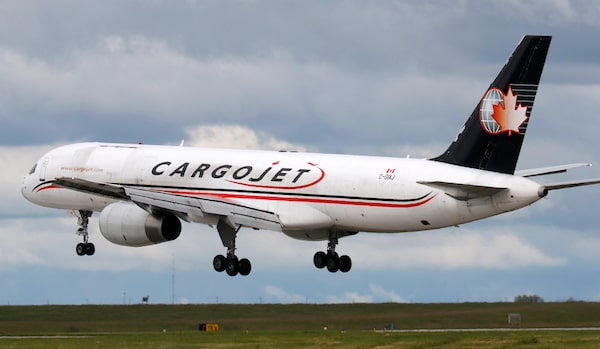
A Boeing 757 (757-200) cargo airplane, belonging to Cargojet (Airways), lands in Calgary, Ab. on July 3, 2018.Larry MacDougal/The Canadian Press
Canada’s Cargojet Inc. has threatened to move work to the United States unless it wins exemption from rules aimed at preventing pilot fatigue because of their cost, according to a deal rejected by its pilots seen by Reuters.
Cargojet has said it wants to reduce costs and grow in the United States as Canada’s largest cargo carrier benefits from an increase in air freight demand due to a decline in “belly capacity” from passenger aircraft grounded during the pandemic.
The Ontario-based company, which reported 30% higher quarterly revenues this month, has hired more than 60 pilots in the past three to four months to meet stronger demand and comply with Canadian rules that went into effect in December. Those shorten the number of hours pilots can work at night and extend their rest periods, among other conditions.
But 65% of Cargojet’s 283 pilots on Wednesday voted against supporting the company’s bid for an exemption from regulator Transport Canada, their union Unifor said by email. The company does not need union support for the exemption but hoped to have it.
Cargojet, which operates certain flights for Amazon.com Inc., had offered to protect jobs as part of the deal. Cargojet Chief Executive Ajay Virmani told analysts this month he was seeking a U.S. investment or partner for its “growth strategy across the border.”
Cargojet did not respond to a request for comment. Transport Canada was not immediately available for comment on Wednesday but said on Tuesday it had not received an exemption request from Cargojet.
Cargojet warned that it might have to lay off up to 130 pilots and move “part of its operation” to the United States due to fatigue rules that create “an uneven playing field” with American cargo carriers, according to the proposed deal.
The agreement generated controversy among pilots on both sides of the border, pitting concerns over protecting Canada’s hard-won fatigue rules against jobs at a time when cargo has emerged as an oasis of growth in aviation.
Scott Doherty, a Unifor official, said in an interview it was a problem for “us to be losing jobs to the U.S. during a pandemic because they play by a different set of rules.”
While U.S. cargo pilots have restrictions in their contracts to prevent fatigue, they are not comparably covered by federal regulations.
That disparity is a sore point for U.S. unions, including the Air Line Pilots Association (ALPA), which want the same American rules that protect against fatigue in the cockpit of passenger airlines to also cover cargo operators.
Your time is valuable. Have the Top Business Headlines newsletter conveniently delivered to your inbox in the morning or evening. Sign up today.